Legal Aspects of International Trade and Enterprise: Shell Report
VerifiedAdded on 2022/12/26
|10
|2726
|20
Report
AI Summary
This report provides an executive summary and detailed analysis of the legal aspects of Royal Dutch Shell's international trade operations. It explores the legislative and regulatory frameworks that govern the company's activities, including the Corporations Act 2001 (Cth), taxation policies, competition and consumer laws, and employment laws in Australia. The report also examines the impact of various treaties, conventions, and agreements on Shell's business, such as the ChAFTA, ANZCERTA, UNFCCC, and AANZFTA. These agreements influence Shell's operations by affecting tariffs, trade relationships, and environmental responsibilities. The report highlights the importance of compliance with these legal and regulatory requirements for Shell to operate successfully in various markets and avoid legal penalties. The company's diversification into renewable energy is also mentioned.
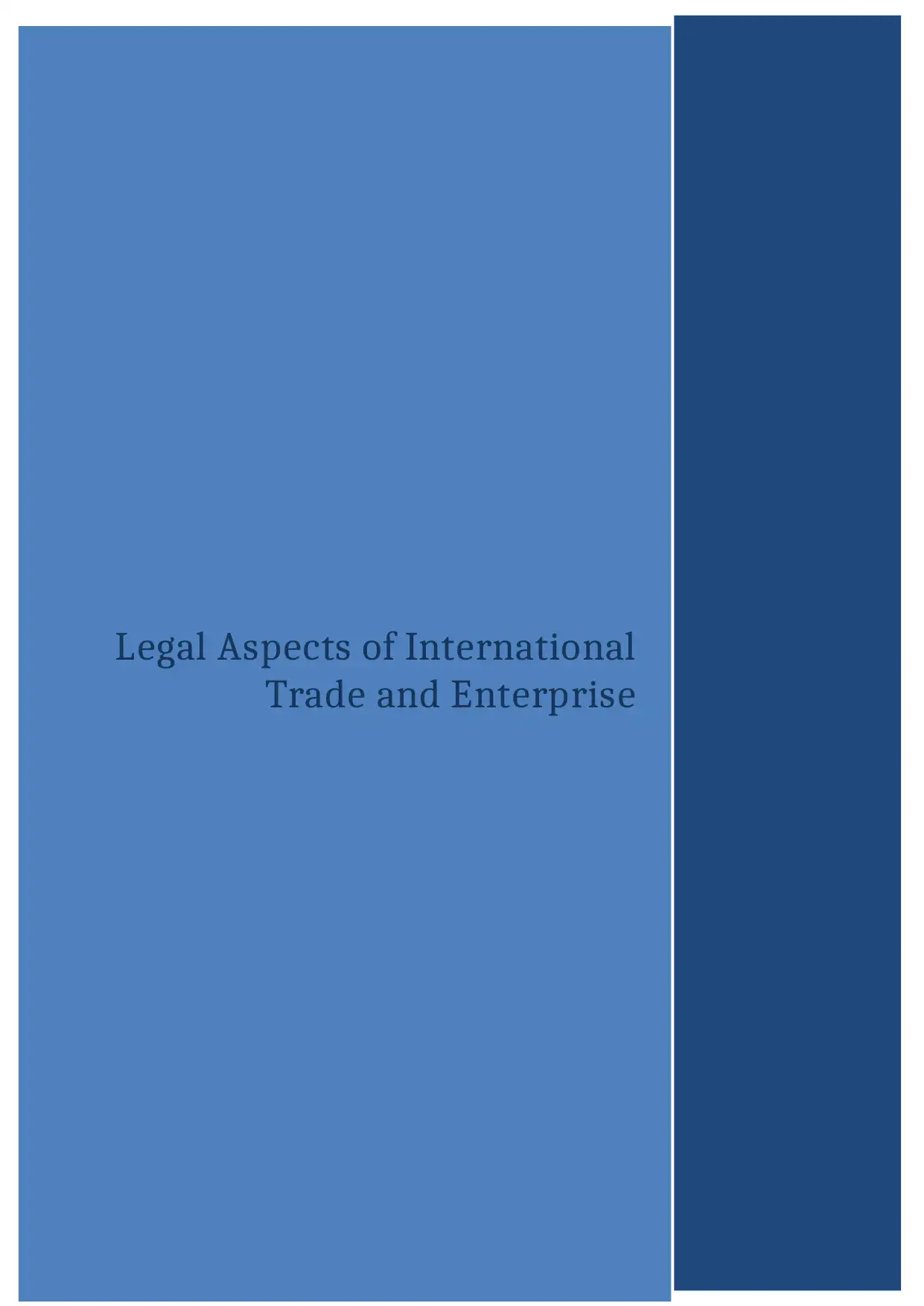
Legal Aspects of International
Trade and Enterprise
Trade and Enterprise
Paraphrase This Document
Need a fresh take? Get an instant paraphrase of this document with our AI Paraphraser
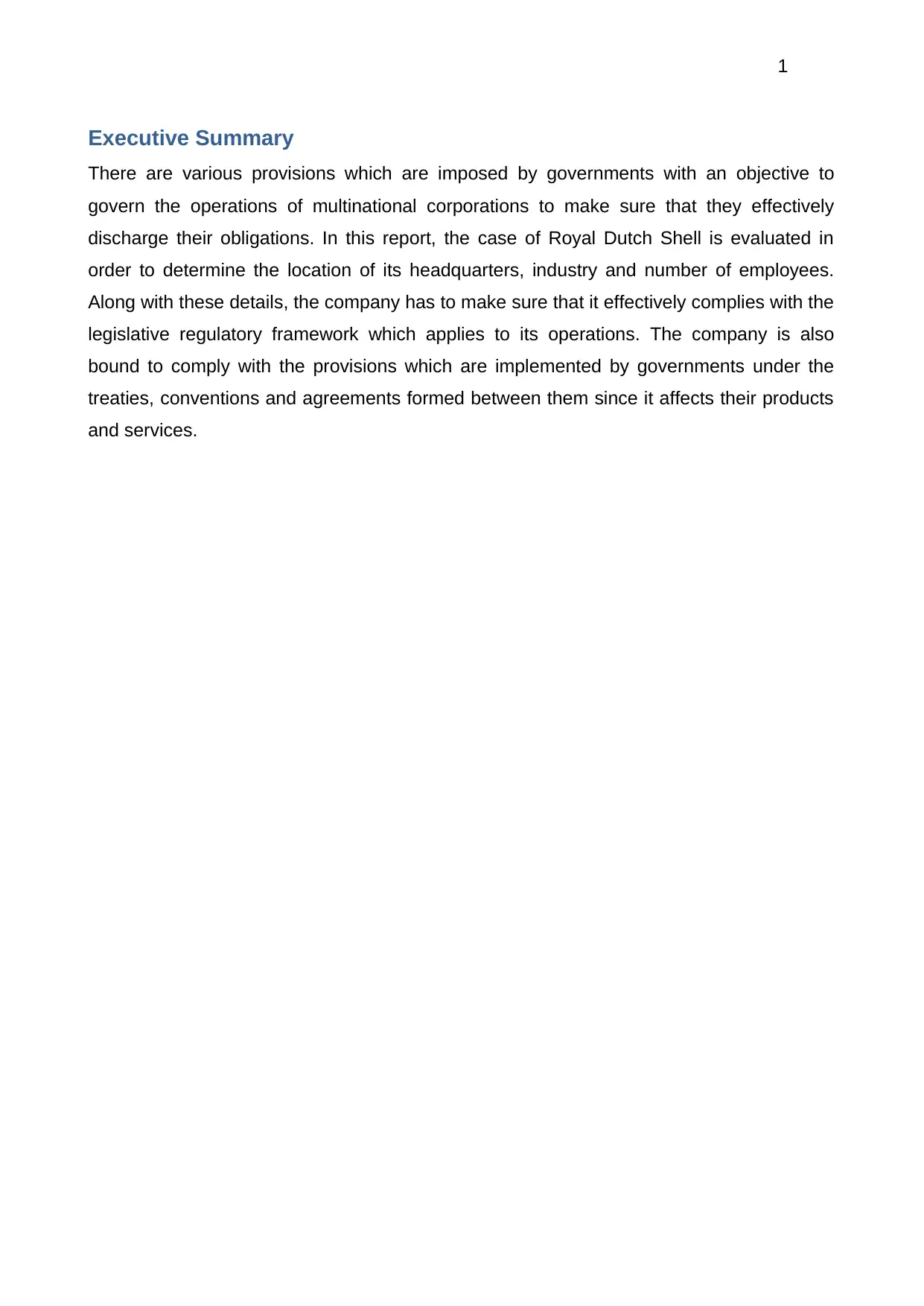
1
Executive Summary
There are various provisions which are imposed by governments with an objective to
govern the operations of multinational corporations to make sure that they effectively
discharge their obligations. In this report, the case of Royal Dutch Shell is evaluated in
order to determine the location of its headquarters, industry and number of employees.
Along with these details, the company has to make sure that it effectively complies with the
legislative regulatory framework which applies to its operations. The company is also
bound to comply with the provisions which are implemented by governments under the
treaties, conventions and agreements formed between them since it affects their products
and services.
Executive Summary
There are various provisions which are imposed by governments with an objective to
govern the operations of multinational corporations to make sure that they effectively
discharge their obligations. In this report, the case of Royal Dutch Shell is evaluated in
order to determine the location of its headquarters, industry and number of employees.
Along with these details, the company has to make sure that it effectively complies with the
legislative regulatory framework which applies to its operations. The company is also
bound to comply with the provisions which are implemented by governments under the
treaties, conventions and agreements formed between them since it affects their products
and services.
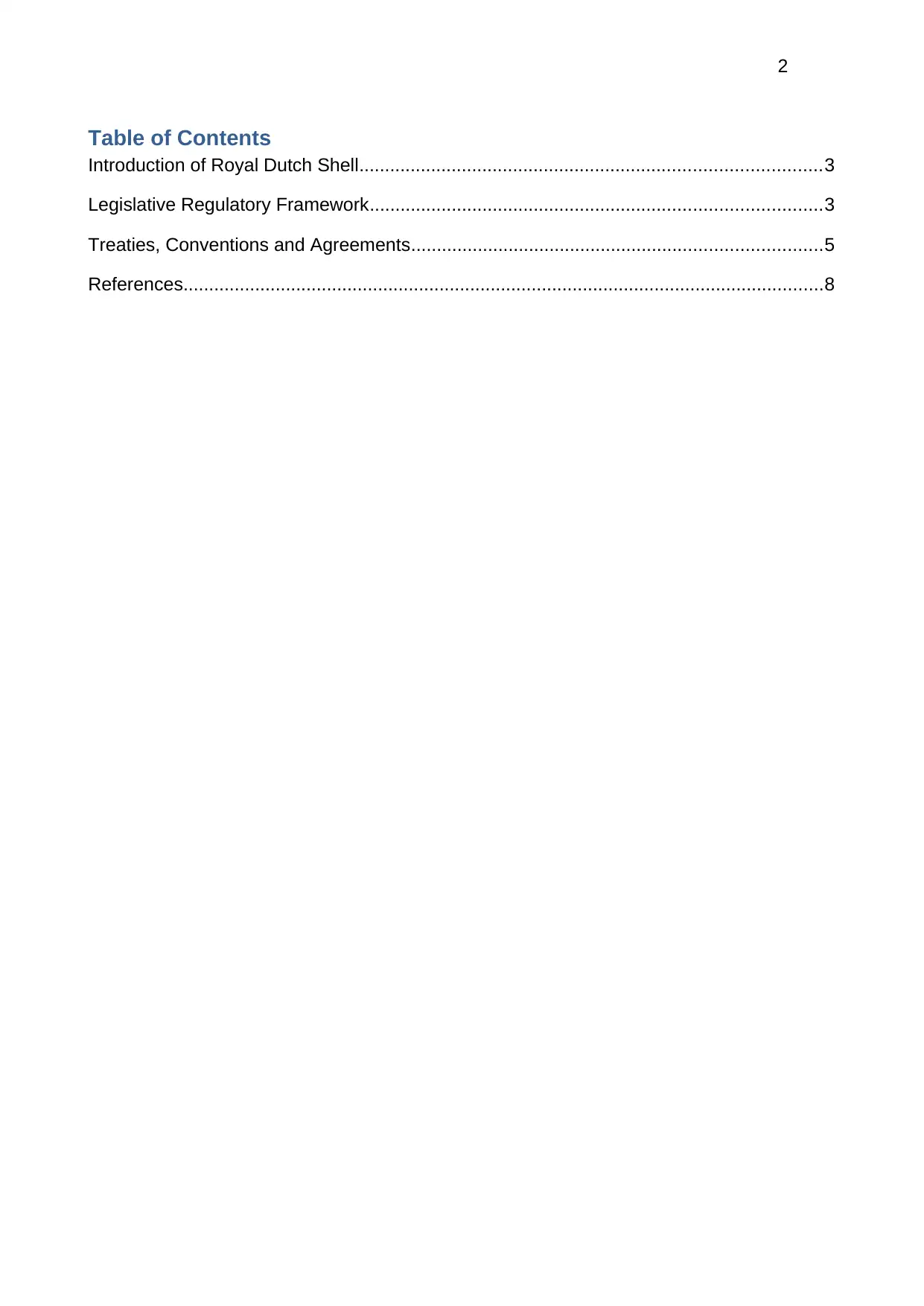
2
Table of Contents
Introduction of Royal Dutch Shell..........................................................................................3
Legislative Regulatory Framework........................................................................................3
Treaties, Conventions and Agreements................................................................................5
References.............................................................................................................................8
Table of Contents
Introduction of Royal Dutch Shell..........................................................................................3
Legislative Regulatory Framework........................................................................................3
Treaties, Conventions and Agreements................................................................................5
References.............................................................................................................................8
⊘ This is a preview!⊘
Do you want full access?
Subscribe today to unlock all pages.

Trusted by 1+ million students worldwide
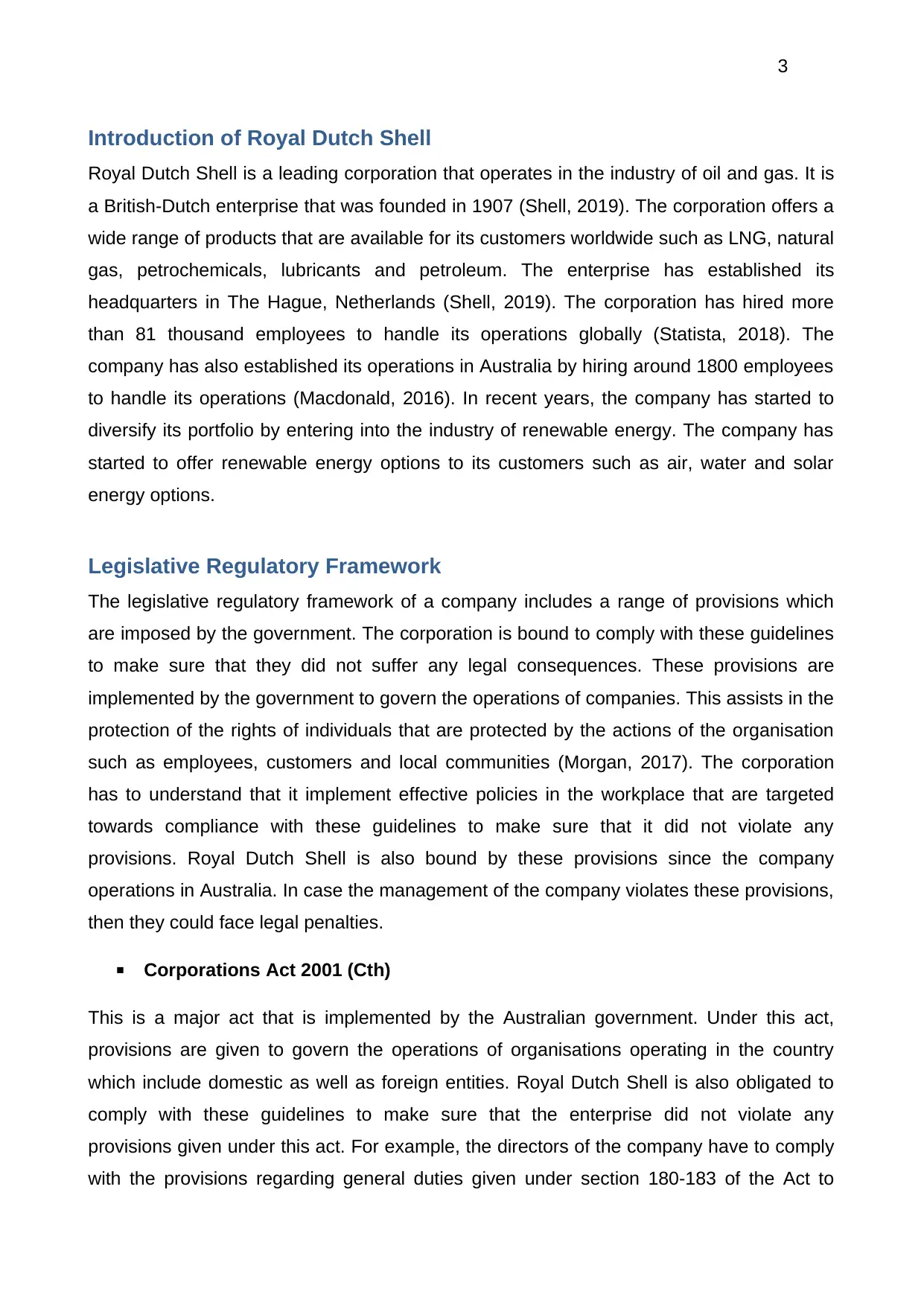
3
Introduction of Royal Dutch Shell
Royal Dutch Shell is a leading corporation that operates in the industry of oil and gas. It is
a British-Dutch enterprise that was founded in 1907 (Shell, 2019). The corporation offers a
wide range of products that are available for its customers worldwide such as LNG, natural
gas, petrochemicals, lubricants and petroleum. The enterprise has established its
headquarters in The Hague, Netherlands (Shell, 2019). The corporation has hired more
than 81 thousand employees to handle its operations globally (Statista, 2018). The
company has also established its operations in Australia by hiring around 1800 employees
to handle its operations (Macdonald, 2016). In recent years, the company has started to
diversify its portfolio by entering into the industry of renewable energy. The company has
started to offer renewable energy options to its customers such as air, water and solar
energy options.
Legislative Regulatory Framework
The legislative regulatory framework of a company includes a range of provisions which
are imposed by the government. The corporation is bound to comply with these guidelines
to make sure that they did not suffer any legal consequences. These provisions are
implemented by the government to govern the operations of companies. This assists in the
protection of the rights of individuals that are protected by the actions of the organisation
such as employees, customers and local communities (Morgan, 2017). The corporation
has to understand that it implement effective policies in the workplace that are targeted
towards compliance with these guidelines to make sure that it did not violate any
provisions. Royal Dutch Shell is also bound by these provisions since the company
operations in Australia. In case the management of the company violates these provisions,
then they could face legal penalties.
Corporations Act 2001 (Cth)
This is a major act that is implemented by the Australian government. Under this act,
provisions are given to govern the operations of organisations operating in the country
which include domestic as well as foreign entities. Royal Dutch Shell is also obligated to
comply with these guidelines to make sure that the enterprise did not violate any
provisions given under this act. For example, the directors of the company have to comply
with the provisions regarding general duties given under section 180-183 of the Act to
Introduction of Royal Dutch Shell
Royal Dutch Shell is a leading corporation that operates in the industry of oil and gas. It is
a British-Dutch enterprise that was founded in 1907 (Shell, 2019). The corporation offers a
wide range of products that are available for its customers worldwide such as LNG, natural
gas, petrochemicals, lubricants and petroleum. The enterprise has established its
headquarters in The Hague, Netherlands (Shell, 2019). The corporation has hired more
than 81 thousand employees to handle its operations globally (Statista, 2018). The
company has also established its operations in Australia by hiring around 1800 employees
to handle its operations (Macdonald, 2016). In recent years, the company has started to
diversify its portfolio by entering into the industry of renewable energy. The company has
started to offer renewable energy options to its customers such as air, water and solar
energy options.
Legislative Regulatory Framework
The legislative regulatory framework of a company includes a range of provisions which
are imposed by the government. The corporation is bound to comply with these guidelines
to make sure that they did not suffer any legal consequences. These provisions are
implemented by the government to govern the operations of companies. This assists in the
protection of the rights of individuals that are protected by the actions of the organisation
such as employees, customers and local communities (Morgan, 2017). The corporation
has to understand that it implement effective policies in the workplace that are targeted
towards compliance with these guidelines to make sure that it did not violate any
provisions. Royal Dutch Shell is also bound by these provisions since the company
operations in Australia. In case the management of the company violates these provisions,
then they could face legal penalties.
Corporations Act 2001 (Cth)
This is a major act that is implemented by the Australian government. Under this act,
provisions are given to govern the operations of organisations operating in the country
which include domestic as well as foreign entities. Royal Dutch Shell is also obligated to
comply with these guidelines to make sure that the enterprise did not violate any
provisions given under this act. For example, the directors of the company have to comply
with the provisions regarding general duties given under section 180-183 of the Act to
Paraphrase This Document
Need a fresh take? Get an instant paraphrase of this document with our AI Paraphraser
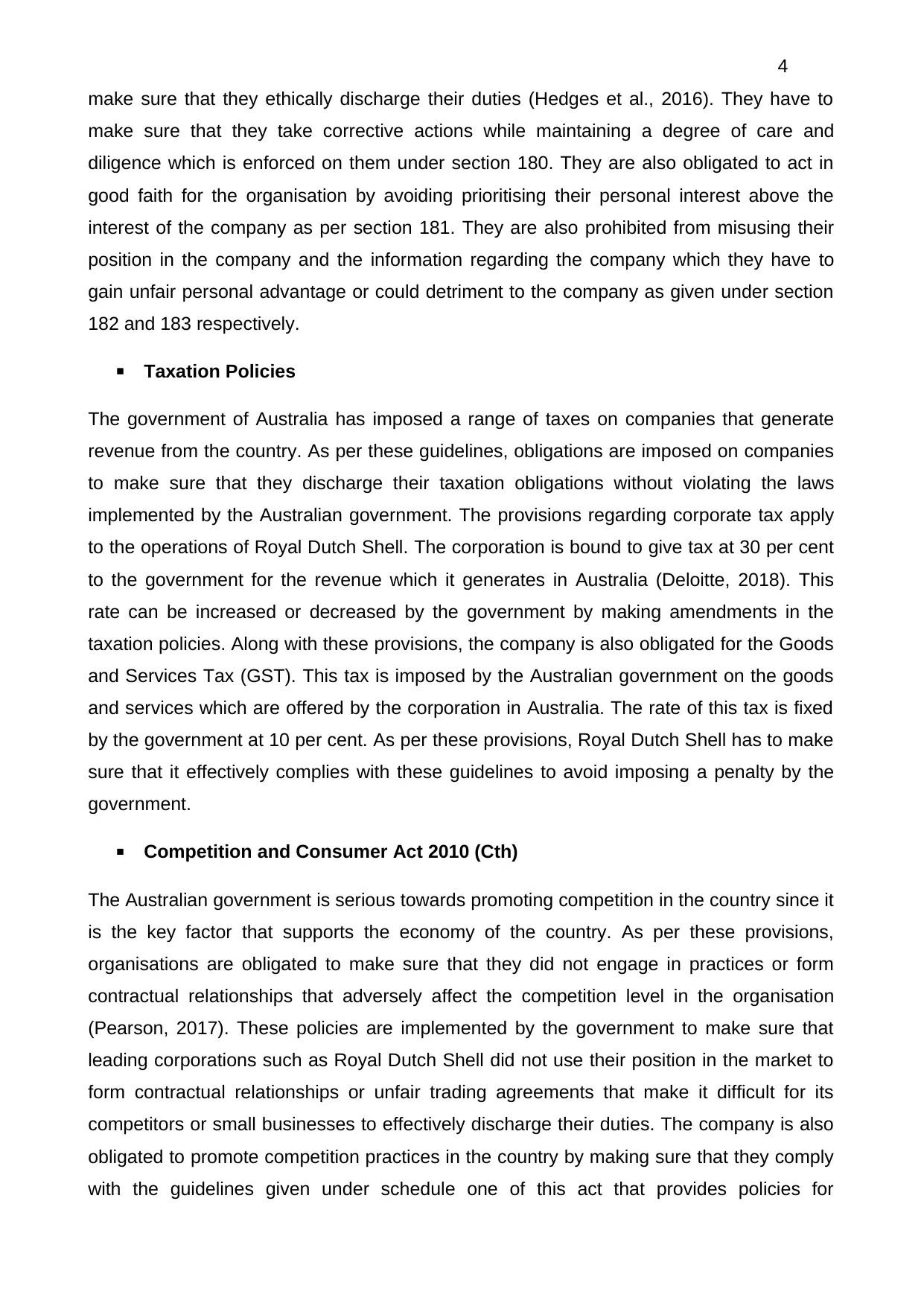
4
make sure that they ethically discharge their duties (Hedges et al., 2016). They have to
make sure that they take corrective actions while maintaining a degree of care and
diligence which is enforced on them under section 180. They are also obligated to act in
good faith for the organisation by avoiding prioritising their personal interest above the
interest of the company as per section 181. They are also prohibited from misusing their
position in the company and the information regarding the company which they have to
gain unfair personal advantage or could detriment to the company as given under section
182 and 183 respectively.
Taxation Policies
The government of Australia has imposed a range of taxes on companies that generate
revenue from the country. As per these guidelines, obligations are imposed on companies
to make sure that they discharge their taxation obligations without violating the laws
implemented by the Australian government. The provisions regarding corporate tax apply
to the operations of Royal Dutch Shell. The corporation is bound to give tax at 30 per cent
to the government for the revenue which it generates in Australia (Deloitte, 2018). This
rate can be increased or decreased by the government by making amendments in the
taxation policies. Along with these provisions, the company is also obligated for the Goods
and Services Tax (GST). This tax is imposed by the Australian government on the goods
and services which are offered by the corporation in Australia. The rate of this tax is fixed
by the government at 10 per cent. As per these provisions, Royal Dutch Shell has to make
sure that it effectively complies with these guidelines to avoid imposing a penalty by the
government.
Competition and Consumer Act 2010 (Cth)
The Australian government is serious towards promoting competition in the country since it
is the key factor that supports the economy of the country. As per these provisions,
organisations are obligated to make sure that they did not engage in practices or form
contractual relationships that adversely affect the competition level in the organisation
(Pearson, 2017). These policies are implemented by the government to make sure that
leading corporations such as Royal Dutch Shell did not use their position in the market to
form contractual relationships or unfair trading agreements that make it difficult for its
competitors or small businesses to effectively discharge their duties. The company is also
obligated to promote competition practices in the country by making sure that they comply
with the guidelines given under schedule one of this act that provides policies for
make sure that they ethically discharge their duties (Hedges et al., 2016). They have to
make sure that they take corrective actions while maintaining a degree of care and
diligence which is enforced on them under section 180. They are also obligated to act in
good faith for the organisation by avoiding prioritising their personal interest above the
interest of the company as per section 181. They are also prohibited from misusing their
position in the company and the information regarding the company which they have to
gain unfair personal advantage or could detriment to the company as given under section
182 and 183 respectively.
Taxation Policies
The government of Australia has imposed a range of taxes on companies that generate
revenue from the country. As per these guidelines, obligations are imposed on companies
to make sure that they discharge their taxation obligations without violating the laws
implemented by the Australian government. The provisions regarding corporate tax apply
to the operations of Royal Dutch Shell. The corporation is bound to give tax at 30 per cent
to the government for the revenue which it generates in Australia (Deloitte, 2018). This
rate can be increased or decreased by the government by making amendments in the
taxation policies. Along with these provisions, the company is also obligated for the Goods
and Services Tax (GST). This tax is imposed by the Australian government on the goods
and services which are offered by the corporation in Australia. The rate of this tax is fixed
by the government at 10 per cent. As per these provisions, Royal Dutch Shell has to make
sure that it effectively complies with these guidelines to avoid imposing a penalty by the
government.
Competition and Consumer Act 2010 (Cth)
The Australian government is serious towards promoting competition in the country since it
is the key factor that supports the economy of the country. As per these provisions,
organisations are obligated to make sure that they did not engage in practices or form
contractual relationships that adversely affect the competition level in the organisation
(Pearson, 2017). These policies are implemented by the government to make sure that
leading corporations such as Royal Dutch Shell did not use their position in the market to
form contractual relationships or unfair trading agreements that make it difficult for its
competitors or small businesses to effectively discharge their duties. The company is also
obligated to promote competition practices in the country by making sure that they comply
with the guidelines given under schedule one of this act that provides policies for
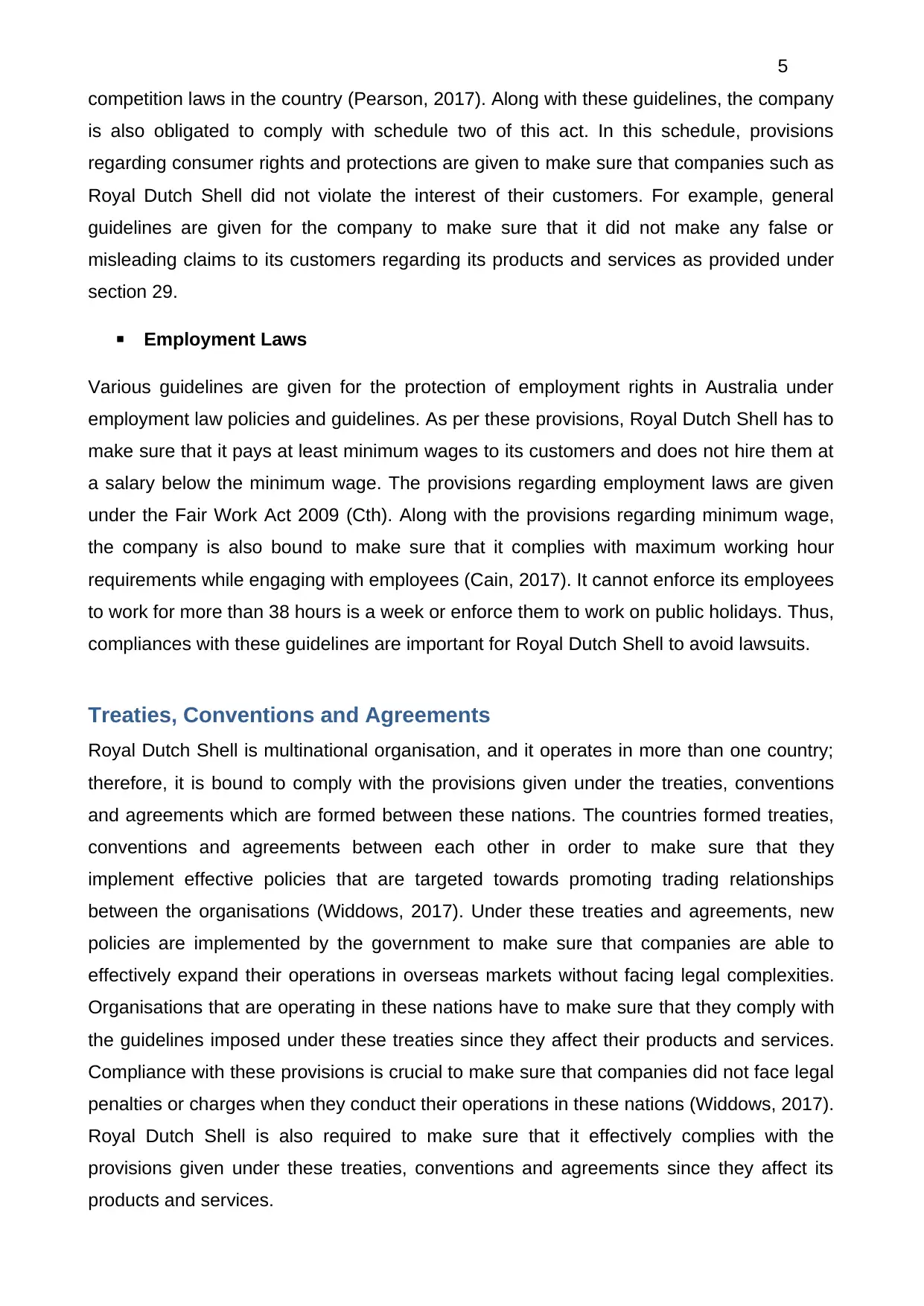
5
competition laws in the country (Pearson, 2017). Along with these guidelines, the company
is also obligated to comply with schedule two of this act. In this schedule, provisions
regarding consumer rights and protections are given to make sure that companies such as
Royal Dutch Shell did not violate the interest of their customers. For example, general
guidelines are given for the company to make sure that it did not make any false or
misleading claims to its customers regarding its products and services as provided under
section 29.
Employment Laws
Various guidelines are given for the protection of employment rights in Australia under
employment law policies and guidelines. As per these provisions, Royal Dutch Shell has to
make sure that it pays at least minimum wages to its customers and does not hire them at
a salary below the minimum wage. The provisions regarding employment laws are given
under the Fair Work Act 2009 (Cth). Along with the provisions regarding minimum wage,
the company is also bound to make sure that it complies with maximum working hour
requirements while engaging with employees (Cain, 2017). It cannot enforce its employees
to work for more than 38 hours is a week or enforce them to work on public holidays. Thus,
compliances with these guidelines are important for Royal Dutch Shell to avoid lawsuits.
Treaties, Conventions and Agreements
Royal Dutch Shell is multinational organisation, and it operates in more than one country;
therefore, it is bound to comply with the provisions given under the treaties, conventions
and agreements which are formed between these nations. The countries formed treaties,
conventions and agreements between each other in order to make sure that they
implement effective policies that are targeted towards promoting trading relationships
between the organisations (Widdows, 2017). Under these treaties and agreements, new
policies are implemented by the government to make sure that companies are able to
effectively expand their operations in overseas markets without facing legal complexities.
Organisations that are operating in these nations have to make sure that they comply with
the guidelines imposed under these treaties since they affect their products and services.
Compliance with these provisions is crucial to make sure that companies did not face legal
penalties or charges when they conduct their operations in these nations (Widdows, 2017).
Royal Dutch Shell is also required to make sure that it effectively complies with the
provisions given under these treaties, conventions and agreements since they affect its
products and services.
competition laws in the country (Pearson, 2017). Along with these guidelines, the company
is also obligated to comply with schedule two of this act. In this schedule, provisions
regarding consumer rights and protections are given to make sure that companies such as
Royal Dutch Shell did not violate the interest of their customers. For example, general
guidelines are given for the company to make sure that it did not make any false or
misleading claims to its customers regarding its products and services as provided under
section 29.
Employment Laws
Various guidelines are given for the protection of employment rights in Australia under
employment law policies and guidelines. As per these provisions, Royal Dutch Shell has to
make sure that it pays at least minimum wages to its customers and does not hire them at
a salary below the minimum wage. The provisions regarding employment laws are given
under the Fair Work Act 2009 (Cth). Along with the provisions regarding minimum wage,
the company is also bound to make sure that it complies with maximum working hour
requirements while engaging with employees (Cain, 2017). It cannot enforce its employees
to work for more than 38 hours is a week or enforce them to work on public holidays. Thus,
compliances with these guidelines are important for Royal Dutch Shell to avoid lawsuits.
Treaties, Conventions and Agreements
Royal Dutch Shell is multinational organisation, and it operates in more than one country;
therefore, it is bound to comply with the provisions given under the treaties, conventions
and agreements which are formed between these nations. The countries formed treaties,
conventions and agreements between each other in order to make sure that they
implement effective policies that are targeted towards promoting trading relationships
between the organisations (Widdows, 2017). Under these treaties and agreements, new
policies are implemented by the government to make sure that companies are able to
effectively expand their operations in overseas markets without facing legal complexities.
Organisations that are operating in these nations have to make sure that they comply with
the guidelines imposed under these treaties since they affect their products and services.
Compliance with these provisions is crucial to make sure that companies did not face legal
penalties or charges when they conduct their operations in these nations (Widdows, 2017).
Royal Dutch Shell is also required to make sure that it effectively complies with the
provisions given under these treaties, conventions and agreements since they affect its
products and services.
⊘ This is a preview!⊘
Do you want full access?
Subscribe today to unlock all pages.

Trusted by 1+ million students worldwide
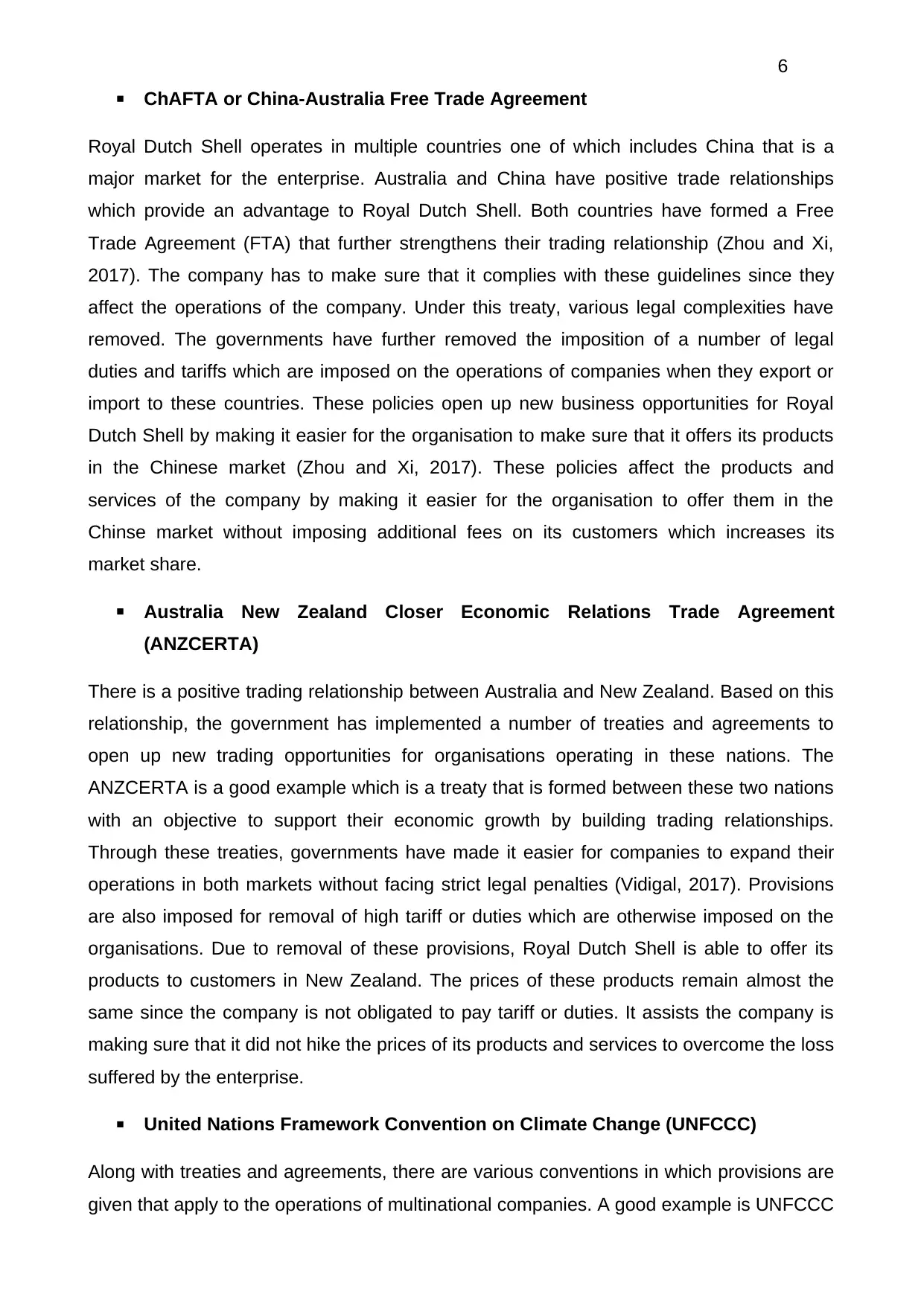
6
ChAFTA or China-Australia Free Trade Agreement
Royal Dutch Shell operates in multiple countries one of which includes China that is a
major market for the enterprise. Australia and China have positive trade relationships
which provide an advantage to Royal Dutch Shell. Both countries have formed a Free
Trade Agreement (FTA) that further strengthens their trading relationship (Zhou and Xi,
2017). The company has to make sure that it complies with these guidelines since they
affect the operations of the company. Under this treaty, various legal complexities have
removed. The governments have further removed the imposition of a number of legal
duties and tariffs which are imposed on the operations of companies when they export or
import to these countries. These policies open up new business opportunities for Royal
Dutch Shell by making it easier for the organisation to make sure that it offers its products
in the Chinese market (Zhou and Xi, 2017). These policies affect the products and
services of the company by making it easier for the organisation to offer them in the
Chinse market without imposing additional fees on its customers which increases its
market share.
Australia New Zealand Closer Economic Relations Trade Agreement
(ANZCERTA)
There is a positive trading relationship between Australia and New Zealand. Based on this
relationship, the government has implemented a number of treaties and agreements to
open up new trading opportunities for organisations operating in these nations. The
ANZCERTA is a good example which is a treaty that is formed between these two nations
with an objective to support their economic growth by building trading relationships.
Through these treaties, governments have made it easier for companies to expand their
operations in both markets without facing strict legal penalties (Vidigal, 2017). Provisions
are also imposed for removal of high tariff or duties which are otherwise imposed on the
organisations. Due to removal of these provisions, Royal Dutch Shell is able to offer its
products to customers in New Zealand. The prices of these products remain almost the
same since the company is not obligated to pay tariff or duties. It assists the company is
making sure that it did not hike the prices of its products and services to overcome the loss
suffered by the enterprise.
United Nations Framework Convention on Climate Change (UNFCCC)
Along with treaties and agreements, there are various conventions in which provisions are
given that apply to the operations of multinational companies. A good example is UNFCCC
ChAFTA or China-Australia Free Trade Agreement
Royal Dutch Shell operates in multiple countries one of which includes China that is a
major market for the enterprise. Australia and China have positive trade relationships
which provide an advantage to Royal Dutch Shell. Both countries have formed a Free
Trade Agreement (FTA) that further strengthens their trading relationship (Zhou and Xi,
2017). The company has to make sure that it complies with these guidelines since they
affect the operations of the company. Under this treaty, various legal complexities have
removed. The governments have further removed the imposition of a number of legal
duties and tariffs which are imposed on the operations of companies when they export or
import to these countries. These policies open up new business opportunities for Royal
Dutch Shell by making it easier for the organisation to make sure that it offers its products
in the Chinese market (Zhou and Xi, 2017). These policies affect the products and
services of the company by making it easier for the organisation to offer them in the
Chinse market without imposing additional fees on its customers which increases its
market share.
Australia New Zealand Closer Economic Relations Trade Agreement
(ANZCERTA)
There is a positive trading relationship between Australia and New Zealand. Based on this
relationship, the government has implemented a number of treaties and agreements to
open up new trading opportunities for organisations operating in these nations. The
ANZCERTA is a good example which is a treaty that is formed between these two nations
with an objective to support their economic growth by building trading relationships.
Through these treaties, governments have made it easier for companies to expand their
operations in both markets without facing strict legal penalties (Vidigal, 2017). Provisions
are also imposed for removal of high tariff or duties which are otherwise imposed on the
organisations. Due to removal of these provisions, Royal Dutch Shell is able to offer its
products to customers in New Zealand. The prices of these products remain almost the
same since the company is not obligated to pay tariff or duties. It assists the company is
making sure that it did not hike the prices of its products and services to overcome the loss
suffered by the enterprise.
United Nations Framework Convention on Climate Change (UNFCCC)
Along with treaties and agreements, there are various conventions in which provisions are
given that apply to the operations of multinational companies. A good example is UNFCCC
Paraphrase This Document
Need a fresh take? Get an instant paraphrase of this document with our AI Paraphraser
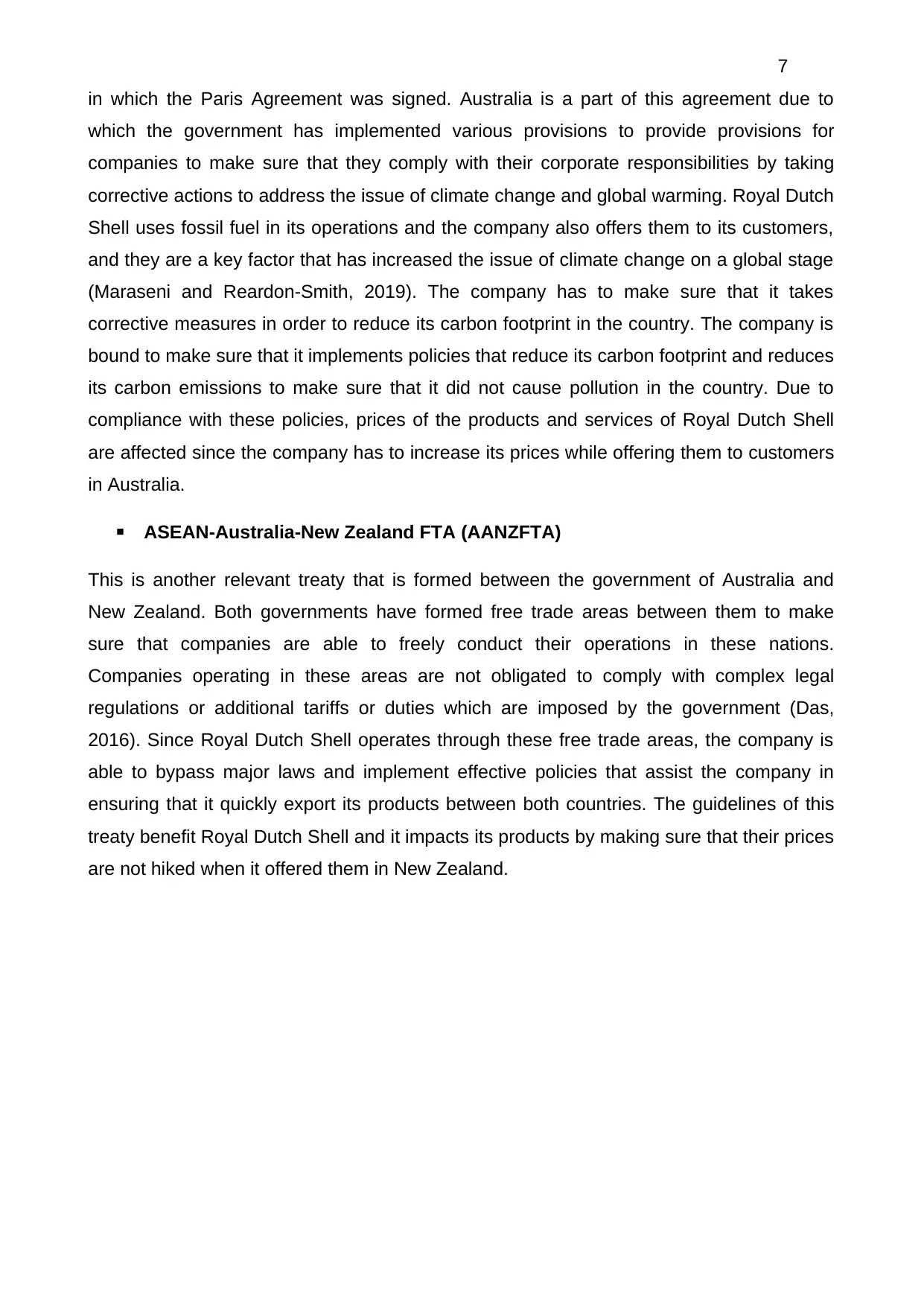
7
in which the Paris Agreement was signed. Australia is a part of this agreement due to
which the government has implemented various provisions to provide provisions for
companies to make sure that they comply with their corporate responsibilities by taking
corrective actions to address the issue of climate change and global warming. Royal Dutch
Shell uses fossil fuel in its operations and the company also offers them to its customers,
and they are a key factor that has increased the issue of climate change on a global stage
(Maraseni and Reardon-Smith, 2019). The company has to make sure that it takes
corrective measures in order to reduce its carbon footprint in the country. The company is
bound to make sure that it implements policies that reduce its carbon footprint and reduces
its carbon emissions to make sure that it did not cause pollution in the country. Due to
compliance with these policies, prices of the products and services of Royal Dutch Shell
are affected since the company has to increase its prices while offering them to customers
in Australia.
ASEAN-Australia-New Zealand FTA (AANZFTA)
This is another relevant treaty that is formed between the government of Australia and
New Zealand. Both governments have formed free trade areas between them to make
sure that companies are able to freely conduct their operations in these nations.
Companies operating in these areas are not obligated to comply with complex legal
regulations or additional tariffs or duties which are imposed by the government (Das,
2016). Since Royal Dutch Shell operates through these free trade areas, the company is
able to bypass major laws and implement effective policies that assist the company in
ensuring that it quickly export its products between both countries. The guidelines of this
treaty benefit Royal Dutch Shell and it impacts its products by making sure that their prices
are not hiked when it offered them in New Zealand.
in which the Paris Agreement was signed. Australia is a part of this agreement due to
which the government has implemented various provisions to provide provisions for
companies to make sure that they comply with their corporate responsibilities by taking
corrective actions to address the issue of climate change and global warming. Royal Dutch
Shell uses fossil fuel in its operations and the company also offers them to its customers,
and they are a key factor that has increased the issue of climate change on a global stage
(Maraseni and Reardon-Smith, 2019). The company has to make sure that it takes
corrective measures in order to reduce its carbon footprint in the country. The company is
bound to make sure that it implements policies that reduce its carbon footprint and reduces
its carbon emissions to make sure that it did not cause pollution in the country. Due to
compliance with these policies, prices of the products and services of Royal Dutch Shell
are affected since the company has to increase its prices while offering them to customers
in Australia.
ASEAN-Australia-New Zealand FTA (AANZFTA)
This is another relevant treaty that is formed between the government of Australia and
New Zealand. Both governments have formed free trade areas between them to make
sure that companies are able to freely conduct their operations in these nations.
Companies operating in these areas are not obligated to comply with complex legal
regulations or additional tariffs or duties which are imposed by the government (Das,
2016). Since Royal Dutch Shell operates through these free trade areas, the company is
able to bypass major laws and implement effective policies that assist the company in
ensuring that it quickly export its products between both countries. The guidelines of this
treaty benefit Royal Dutch Shell and it impacts its products by making sure that their prices
are not hiked when it offered them in New Zealand.
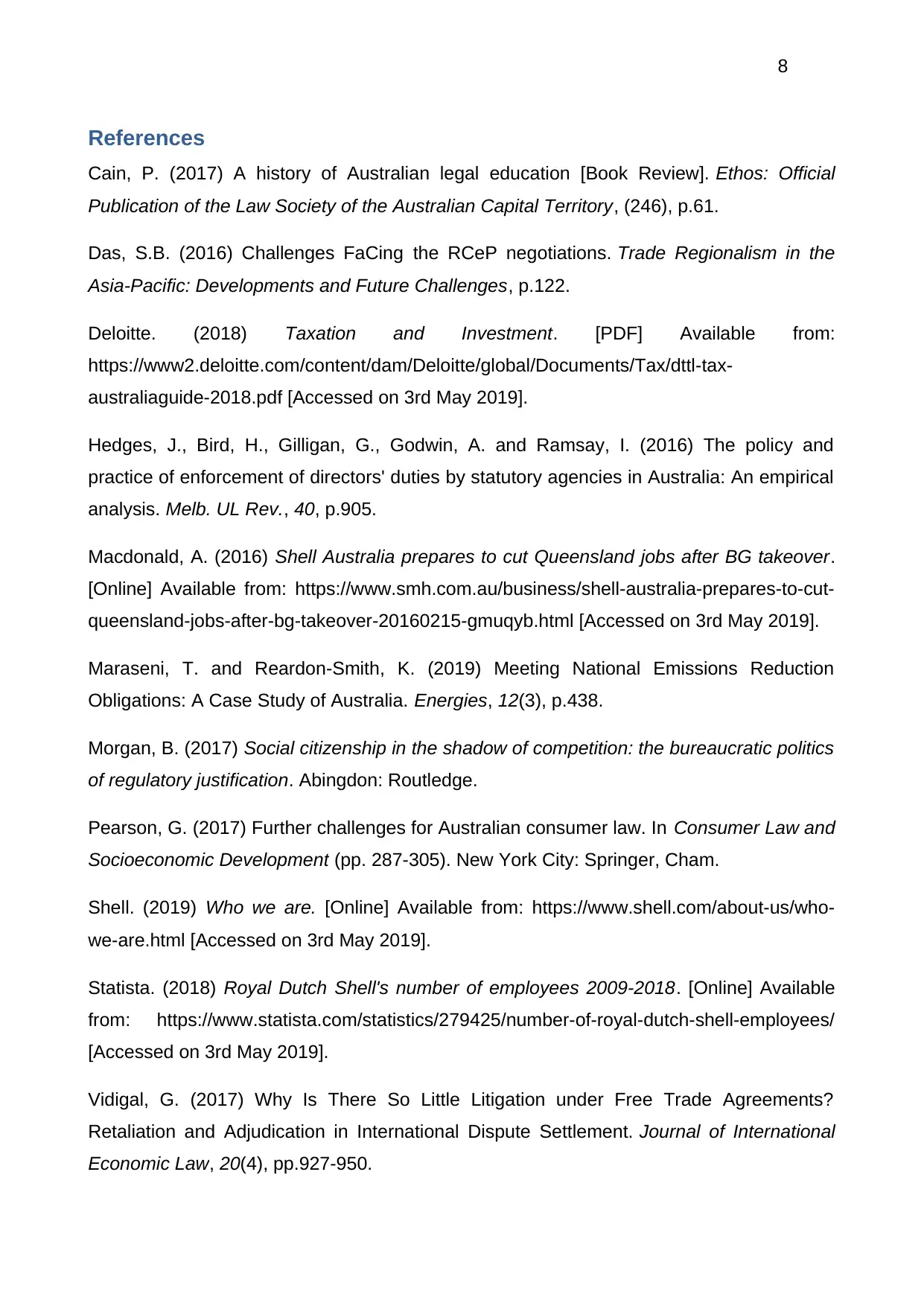
8
References
Cain, P. (2017) A history of Australian legal education [Book Review]. Ethos: Official
Publication of the Law Society of the Australian Capital Territory, (246), p.61.
Das, S.B. (2016) Challenges FaCing the RCeP negotiations. Trade Regionalism in the
Asia-Pacific: Developments and Future Challenges, p.122.
Deloitte. (2018) Taxation and Investment. [PDF] Available from:
https://www2.deloitte.com/content/dam/Deloitte/global/Documents/Tax/dttl-tax-
australiaguide-2018.pdf [Accessed on 3rd May 2019].
Hedges, J., Bird, H., Gilligan, G., Godwin, A. and Ramsay, I. (2016) The policy and
practice of enforcement of directors' duties by statutory agencies in Australia: An empirical
analysis. Melb. UL Rev., 40, p.905.
Macdonald, A. (2016) Shell Australia prepares to cut Queensland jobs after BG takeover.
[Online] Available from: https://www.smh.com.au/business/shell-australia-prepares-to-cut-
queensland-jobs-after-bg-takeover-20160215-gmuqyb.html [Accessed on 3rd May 2019].
Maraseni, T. and Reardon-Smith, K. (2019) Meeting National Emissions Reduction
Obligations: A Case Study of Australia. Energies, 12(3), p.438.
Morgan, B. (2017) Social citizenship in the shadow of competition: the bureaucratic politics
of regulatory justification. Abingdon: Routledge.
Pearson, G. (2017) Further challenges for Australian consumer law. In Consumer Law and
Socioeconomic Development (pp. 287-305). New York City: Springer, Cham.
Shell. (2019) Who we are. [Online] Available from: https://www.shell.com/about-us/who-
we-are.html [Accessed on 3rd May 2019].
Statista. (2018) Royal Dutch Shell's number of employees 2009-2018. [Online] Available
from: https://www.statista.com/statistics/279425/number-of-royal-dutch-shell-employees/
[Accessed on 3rd May 2019].
Vidigal, G. (2017) Why Is There So Little Litigation under Free Trade Agreements?
Retaliation and Adjudication in International Dispute Settlement. Journal of International
Economic Law, 20(4), pp.927-950.
References
Cain, P. (2017) A history of Australian legal education [Book Review]. Ethos: Official
Publication of the Law Society of the Australian Capital Territory, (246), p.61.
Das, S.B. (2016) Challenges FaCing the RCeP negotiations. Trade Regionalism in the
Asia-Pacific: Developments and Future Challenges, p.122.
Deloitte. (2018) Taxation and Investment. [PDF] Available from:
https://www2.deloitte.com/content/dam/Deloitte/global/Documents/Tax/dttl-tax-
australiaguide-2018.pdf [Accessed on 3rd May 2019].
Hedges, J., Bird, H., Gilligan, G., Godwin, A. and Ramsay, I. (2016) The policy and
practice of enforcement of directors' duties by statutory agencies in Australia: An empirical
analysis. Melb. UL Rev., 40, p.905.
Macdonald, A. (2016) Shell Australia prepares to cut Queensland jobs after BG takeover.
[Online] Available from: https://www.smh.com.au/business/shell-australia-prepares-to-cut-
queensland-jobs-after-bg-takeover-20160215-gmuqyb.html [Accessed on 3rd May 2019].
Maraseni, T. and Reardon-Smith, K. (2019) Meeting National Emissions Reduction
Obligations: A Case Study of Australia. Energies, 12(3), p.438.
Morgan, B. (2017) Social citizenship in the shadow of competition: the bureaucratic politics
of regulatory justification. Abingdon: Routledge.
Pearson, G. (2017) Further challenges for Australian consumer law. In Consumer Law and
Socioeconomic Development (pp. 287-305). New York City: Springer, Cham.
Shell. (2019) Who we are. [Online] Available from: https://www.shell.com/about-us/who-
we-are.html [Accessed on 3rd May 2019].
Statista. (2018) Royal Dutch Shell's number of employees 2009-2018. [Online] Available
from: https://www.statista.com/statistics/279425/number-of-royal-dutch-shell-employees/
[Accessed on 3rd May 2019].
Vidigal, G. (2017) Why Is There So Little Litigation under Free Trade Agreements?
Retaliation and Adjudication in International Dispute Settlement. Journal of International
Economic Law, 20(4), pp.927-950.
⊘ This is a preview!⊘
Do you want full access?
Subscribe today to unlock all pages.

Trusted by 1+ million students worldwide
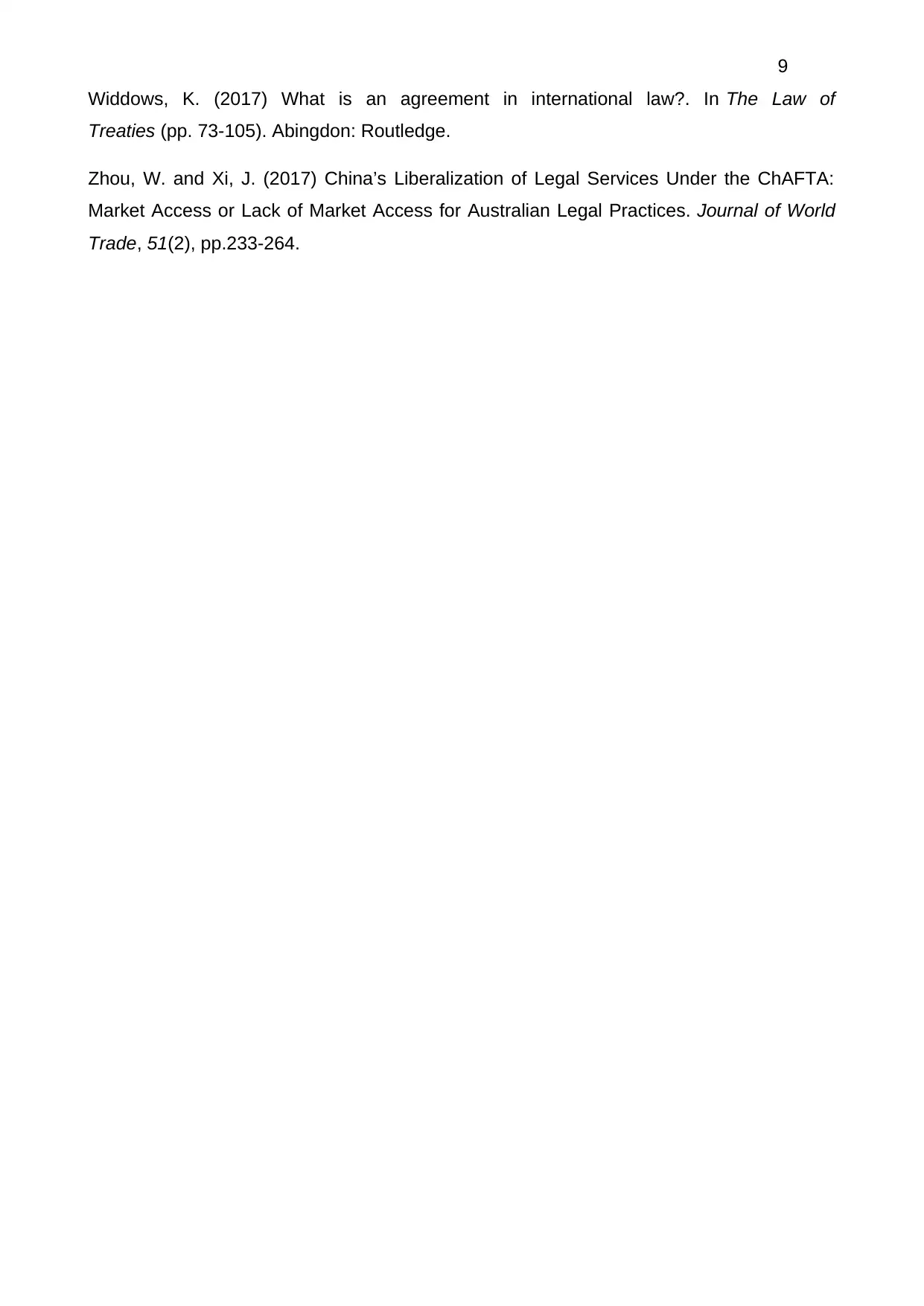
9
Widdows, K. (2017) What is an agreement in international law?. In The Law of
Treaties (pp. 73-105). Abingdon: Routledge.
Zhou, W. and Xi, J. (2017) China’s Liberalization of Legal Services Under the ChAFTA:
Market Access or Lack of Market Access for Australian Legal Practices. Journal of World
Trade, 51(2), pp.233-264.
Widdows, K. (2017) What is an agreement in international law?. In The Law of
Treaties (pp. 73-105). Abingdon: Routledge.
Zhou, W. and Xi, J. (2017) China’s Liberalization of Legal Services Under the ChAFTA:
Market Access or Lack of Market Access for Australian Legal Practices. Journal of World
Trade, 51(2), pp.233-264.
1 out of 10
Related Documents
Your All-in-One AI-Powered Toolkit for Academic Success.
+13062052269
info@desklib.com
Available 24*7 on WhatsApp / Email
![[object Object]](/_next/static/media/star-bottom.7253800d.svg)
Unlock your academic potential
Copyright © 2020–2026 A2Z Services. All Rights Reserved. Developed and managed by ZUCOL.





